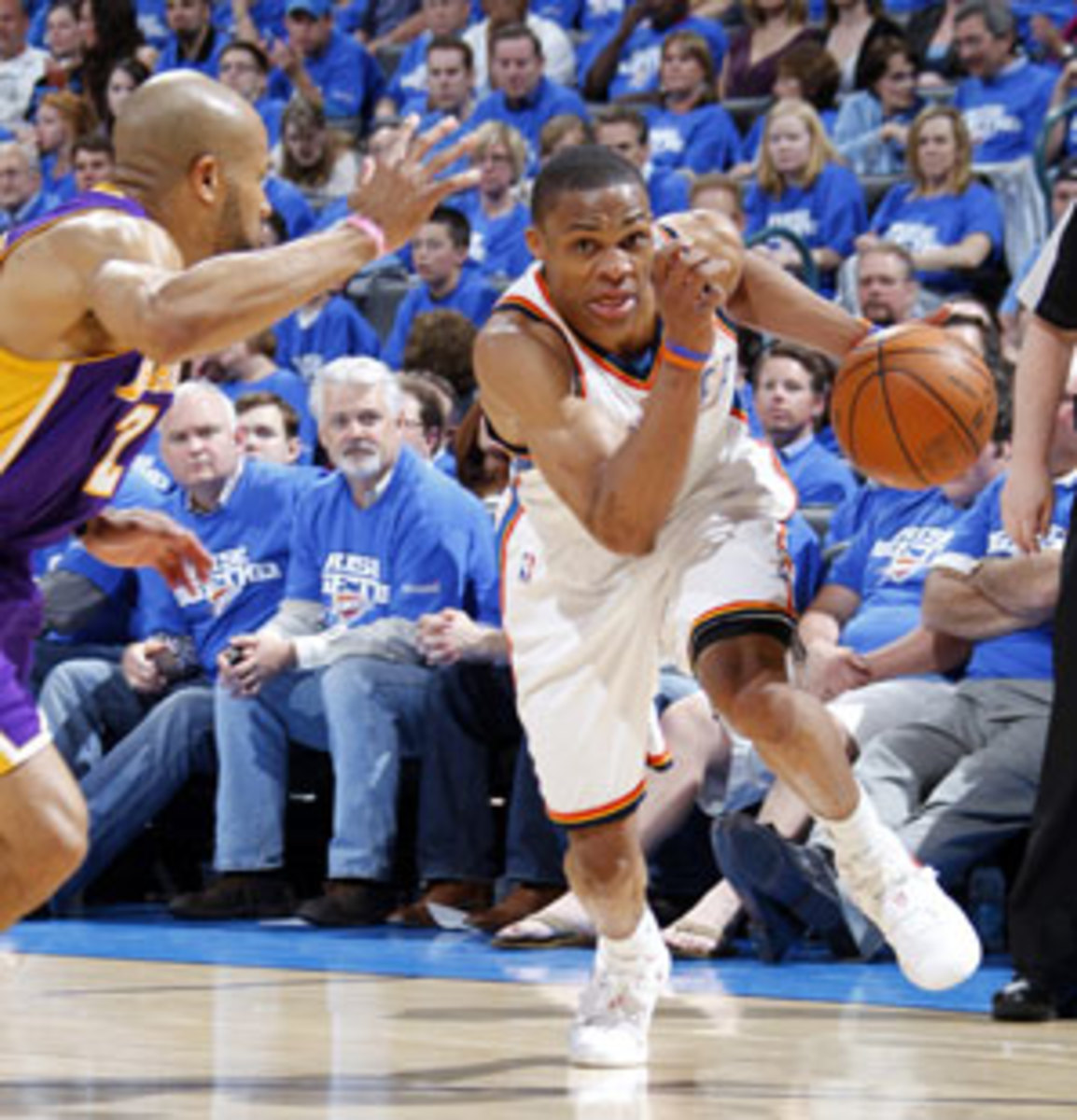Pressure's on Thunder's Westbrook
Russell Westbrook is not just another player on another team trying to prove itself. He's a leader of a team trying to prove itself, and the pressure is on him this season to lift the Thunder to even greater heights than last season.
Oklahoma City was one of the biggest stories of the 2009-2010 season, more than doubling its victory total (from 23 to 50) and pushing the champion Lakers to six games in a hard-fought first-round series.
Now, Westbrook and the Thunder have their eyes on the next step: advancing in the playoffs, something the franchise hasn't done since 2005 when it was located in Seattle.
Coach Scott Brooks expects a lot from his late-blooming, highly motivated third-year point guard.
"I hold him accountable," Brooks said. "When there's a bad turnover, he needs to know about it. We can't just let it go and expect that it'll be fine and just go to the next play.
"It's not an easy spot to be in. You have four other guys on the court who always want the ball and they always feel like they're open. And you have a coach that wants you to pass it to a certain spot on the floor. You have to be able to handle that. We've had some tough conversations and we'll continue to have them, but we have great dialogue. I coach him hard and he knows that and he wants that and he expects that. We don't back down."
That approach seems to be working. Westbrook made the All-Rookie first team two years ago, and last season he upped his assist average from 5.3 to 8.0 while adding 16.1 points and 4.9 rebounds. He was even more effective in the playoffs, averaging 20.5 points, six assists and six rebounds. Westbrook then joined teammate Kevin Durant on the U.S.' gold-medal-winning FIBA World Championship team in the offseason.
With a 6-8 wingspan and feet his college coach, UCLA's Ben Howland, described as "unbelievably quick," Russell is a product of effort as much as talent.
"When I saw him the first time, he was leading his team through a practice at 7 a.m.," Howland said of his visit to see Westbrook when he was a senior at Leuzinger High near Los Angeles. "He came in, mopped up the floor and then led his team through a hard workout."
Howland also saw a player who couldn't dunk until his senior year of high school.
"Russell played a lot like Sam Cassell, an older-man's game, before he grew into his body," said Reggie Morris, Westbrook's high school coach and family confidant. "When you do that, you get taller, but sometimes you don't gain all the strength and athleticism and explosion until you are totally comfortable. As a high school coach, you see kids try to dunk all the time and you know that some people won't use it unless they are on a breakaway. Russell was able to use his jumping ability to rebound more balls and to dunk on people and change games."
After sprouting five inches to 6-foot-3, Westbrook averaged 25.1 points, 8.7 rebounds and 5.6 assists to lead Leuzinger to a 25-4 record and a league title as a senior. But when he got to UCLA, his stardom faded and he found himself playing behind Darren Collison.
"He had to learn to play more than just one speed, which was all out," Howland said. "And he had to get stronger, which he did as well. But I think it really helped Russell to go against Darren every day in practice as the point guard for the second team. The competition was very heated."
A summer between his freshman and sophomore seasons lifting weights and playing against the likes of Derek Fisher and Earl Watson helped him earn a regular role in the Bruins' rotation, as well as the Pac-10 Defensive Player of the Year award. In 2008, he was drafted fourth overall by the Thunder.
"He played himself into the fourth pick by going to all the workouts and blowing everybody away with his athleticism, his work ethic and what a great kid he is," Howland said. "He's charismatic. He's got a great smile. He's very goal-oriented and humble."
Said Morris: "He's a mixture of a whole lot of things that don't really go together. He's stubbornly tough when it comes to basketball, but at the same time he's super coachable. He's competitive to the point of being mean on the basketball floor, but off the floor he doesn't have a mean bone in his body."
Westbrook said he picked up many of his skills from his father, Russell Westbrook Sr., especially that of working hard and honing his fundamentals. He makes a point to speak to his parents daily.
"We talk about how I'm doing off the floor, and that's the type of advice I need," Westbrook said.
With his improving game and successful stint on the world stage during the summer, Westbrook is becoming more than just a Robin to Durant's Batman -- and in the process he's quieting critics who felt the soon-to-be 22-year-old would never develop into a true point guard. Westbrook has addressed his inconsistent shooting by getting to the gym an hour-and-a-half before practice. He's also subtly taken responsibility for a team led by MVP favorite Durant, helping organize video-game nights at players' homes when he's not trying to keep teammates in rhythm with his passing.
"My role is just to go out there and lead my team," Westbrook said. "I've learned a lot of stuff from watching film, how to be more professional on and off the floor. But you don't want to think too much because if you think too much, then things go bad. You've got to go out there and just play your game and have fun, but at the same time have control over what's going on."






